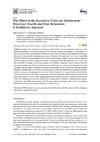Identificador persistente para citar o vincular este elemento:
https://accedacris.ulpgc.es/jspui/handle/10553/70176
| Campo DC | Valor | idioma |
|---|---|---|
| dc.contributor.author | Zozaya, Néboa | en_US |
| dc.contributor.author | Vallejo Torres, Laura | en_US |
| dc.date.accessioned | 2020-02-06T07:16:58Z | - |
| dc.date.available | 2020-02-06T07:16:58Z | - |
| dc.date.issued | 2020 | en_US |
| dc.identifier.issn | 1661-7827 | en_US |
| dc.identifier.other | Scopus | - |
| dc.identifier.uri | https://accedacris.ulpgc.es/handle/10553/70176 | - |
| dc.description.abstract | Background: Previous studies have analyzed the impact of economic crises on adult’s health and lifestyles, but evidence among children and adolescents is limited. The objective of this study was to analyze the impact of the economic crisis on self-perceived health and some risk behaviors in the Spanish adolescent population. Methods: We used data from four waves (2002, 2006, 2010, 2014) of the Health Behavior in School-Aged Children (HBSC) survey in Spain. Separate multilevel logistic and linear regression models were applied for health complaints, self-rated health, life satisfaction, smoking, alcohol consumption, and breakfast skipping. Annual change in Spanish regional unemployment rates was used as a proxy of the economic crisis. An increasing set of control variables were included, consisting of individual, socioeconomic, and family and peer relationships indicators. Median odds ratios were estimated to quantify the cross-region and cross-school variation. Results: Increases in unemployment rates were linked to a higher risk of poorer health and bad habits in the simplest models. The effect was no longer statistically significant when indicators of family and peer relationships were included, suggesting a protective effect against the impact of the economic crisis. Our findings also show that schools had a larger effect on health and lifestyles than regions. Conclusion: The child’s social context—family, peers, school, and region—play an important role on the effects of the economic crisis on health and risk behaviors. | en_US |
| dc.language | eng | en_US |
| dc.relation.ispartof | International Journal of Environmental Research and Public Health | en_US |
| dc.source | International Journal of Environmental Research and Public Health [ISSN 1661-7827], v. 17 (2) | en_US |
| dc.subject | 32 Ciencias médicas | en_US |
| dc.subject.other | Adolescents | en_US |
| dc.subject.other | Children | en_US |
| dc.subject.other | Economic Crisis | en_US |
| dc.subject.other | Hbsc | en_US |
| dc.subject.other | Health | en_US |
| dc.subject.other | Lifestyles | en_US |
| dc.subject.other | Multilevel Analysis | en_US |
| dc.subject.other | Recession | en_US |
| dc.subject.other | Risk Behaviors | en_US |
| dc.subject.other | Teenagers | en_US |
| dc.title | The effect of the economic crisis on adolescents’ perceived health and risk behaviors: A multilevel analysis | en_US |
| dc.type | info:eu-repo/semantics/article | en_US |
| dc.type | Article | en_US |
| dc.identifier.doi | 10.3390/ijerph17020643 | en_US |
| dc.identifier.scopus | 85078134535 | - |
| dc.contributor.authorscopusid | 9842960600 | - |
| dc.contributor.authorscopusid | 57214077907 | - |
| dc.identifier.issue | 2 | - |
| dc.relation.volume | 17 | - |
| dc.investigacion | Ciencias de la Salud | en_US |
| dc.type2 | Artículo | en_US |
| dc.utils.revision | Sí | en_US |
| dc.identifier.ulpgc | Sí | es |
| dc.description.sjr | 0,747 | |
| dc.description.jcr | 3,39 | |
| dc.description.sjrq | Q2 | |
| dc.description.jcrq | Q1 | |
| dc.description.scie | SCIE | |
| dc.description.ssci | SSCI | |
| item.fulltext | Con texto completo | - |
| item.grantfulltext | open | - |
| crisitem.author.dept | GIR Economía de la salud y políticas públicas | - |
| crisitem.author.dept | Departamento de Métodos Cuantitativos en Economía y Gestión | - |
| crisitem.author.orcid | 0000-0001-5833-6066 | - |
| crisitem.author.parentorg | Departamento de Métodos Cuantitativos en Economía y Gestión | - |
| crisitem.author.fullName | Vallejo Torres, Laura | - |
| Colección: | Artículos | |
Citas SCOPUSTM
13
actualizado el 08-jun-2025
Citas de WEB OF SCIENCETM
Citations
11
actualizado el 18-ene-2026
Visitas
61
actualizado el 10-ene-2026
Descargas
64
actualizado el 10-ene-2026
Google ScholarTM
Verifica
Altmetric
Comparte
Exporta metadatos
Los elementos en ULPGC accedaCRIS están protegidos por derechos de autor con todos los derechos reservados, a menos que se indique lo contrario.
